虚拟语气the subjunctive mood 考点总结(自用)
- 格式:doc
- 大小:20.02 KB
- 文档页数:1
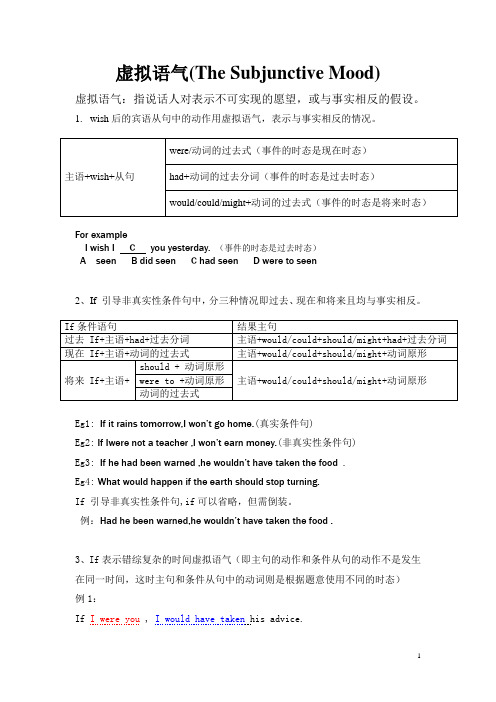
虚拟语气(The Subjunctive Mood)虚拟语气:指说话人对表示不可实现的愿望,或与事实相反的假设。
1.wish后的宾语从句中的动作用虚拟语气,表示与事实相反的情况。
For exampleI wish I C you yesterday. (事件的时态是过去时态)A seenB did seenC had seenD were to seen2、If 引导非真实性条件句中,分三种情况即过去、现在和将来且均与事实相反。
Eg1: If it rains tomorrow,I won’t go home.(真实条件句)Eg2: If Iwere not a teacher ,I won’t earn money.(非真实性条件句)Eg3: If he had been warned ,he wouldn’t have taken the food .Eg4: What would happen if the earth should stop turning.If 引导非真实性条件句,if可以省略,但需倒装。
例:Had he been warned,he wouldn’t have taken the food .3、If表示错综复杂的时间虚拟语气(即主句的动作和条件从句的动作不是发生在同一时间,这时主句和条件从句中的动词则是根据题意使用不同的时态)例1:If I were you , I would have taken his advice.例2:If he listened to me , he wounldn’t be in such a trouble.4、含蓄虚拟结构,即without,but for,otherwise,or,with,but,however。
例1:Without electriesey,ourlife would n’t be quite better today.例2:Lily can’t have arrived yet ,otherwise she would had phoned me.例3:But for the storm,we should have arrived earlier.5、目的状语从句、方式状语从句、让步状语从句中,有时也用虚拟语气。
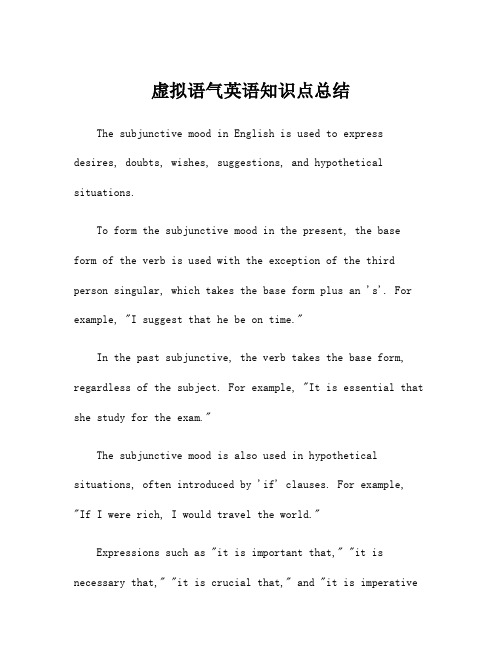
虚拟语气英语知识点总结The subjunctive mood in English is used to express desires, doubts, wishes, suggestions, and hypothetical situations.To form the subjunctive mood in the present, the base form of the verb is used with the exception of the third person singular, which takes the base form plus an 's'. For example, "I suggest that he be on time."In the past subjunctive, the verb takes the base form, regardless of the subject. For example, "It is essential that she study for the exam."The subjunctive mood is also used in hypothetical situations, often introduced by 'if' clauses. For example, "If I were rich, I would travel the world."Expressions such as "it is important that," "it is necessary that," "it is crucial that," and "it is imperativethat" are often followed by the subjunctive mood. For example, "It is essential that he be present at the meeting."In formal English, the subjunctive mood is also used with certain expressions and adjectives such as "lest," "without," "if need be," "worthy," "advisable," "better," "fitter," and "preferable." For example, "I will help him lest he fail."It is important to note that the use of the subjunctive mood is becoming less common in modern English, especially in spoken language, and is often replaced by modal verbs such as "should," "could," or "would." However, the subjunctive moodis still widely used in formal writing and in certain set expressions.Overall, the subjunctive mood is an important aspect of English grammar, allowing speakers and writers to convey a range of feelings, possibilities, and hypothetical situations.。
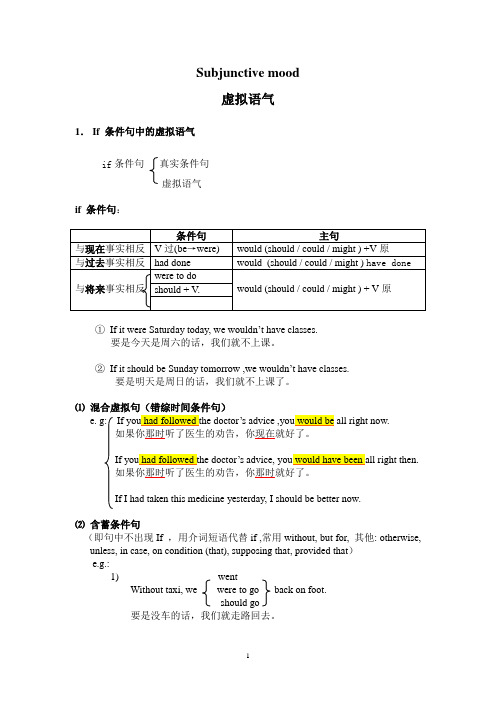
Subjunctive mood虚拟语气1.If 条件句中的虚拟语气if条件句真实条件句虚拟语气if 条件句:①If it were Saturday today, we wouldn’t have classes.要是今天是周六的话,我们就不上课。
②If it should be Sunday tomorrow ,we wouldn’t have classes.要是明天是周日的话,我们就不上课了。
⑴e. g: ’如果你那时听了医生的劝告,你现在就好了。
’如果你那时听了医生的劝告,你那时就好了。
If I had taken this medicine yesterday, I should be better now.⑵含蓄条件句(即句中不出现If ,用介词短语代替if ,常用without, but for, 其他: otherwise, unless, in case, on condition (that), supposing that, provided that)e.g.:1)wentWithout taxi, we were to go back on foot.should go要是没车的话,我们就走路回去。
2)I was busy last week; otherwise, I would have come to see you.上周我很忙,要不我会去看你的。
3)通过上下文的分析→表虚拟I would have called you, but I forgot your number.我那时应打电话给你,但那时我忘了年的号码。
⑶倒装强调句(即句中省略if, 将were, had, should提至主语前)e.g.:1)Were I in your position, I would do it better.如果我处在你的位置上,我会做得更好。
2)Had they made preparations, they would have succeeded.要是他们准备了的话,他们应该能成功的。

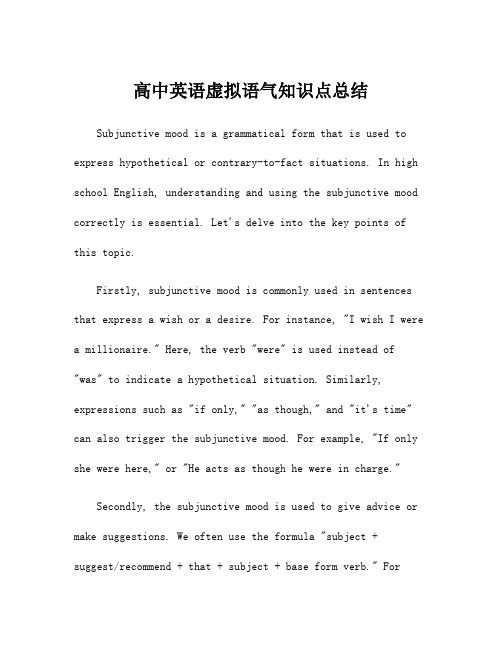
高中英语虚拟语气知识点总结Subjunctive mood is a grammatical form that is used to express hypothetical or contrary-to-fact situations. In high school English, understanding and using the subjunctive mood correctly is essential. Let's delve into the key points of this topic.Firstly, subjunctive mood is commonly used in sentences that express a wish or a desire. For instance, "I wish I were a millionaire." Here, the verb "were" is used instead of "was" to indicate a hypothetical situation. Similarly, expressions such as "if only," "as though," and "it's time" can also trigger the subjunctive mood. For example, "If only she were here," or "He acts as though he were in charge."Secondly, the subjunctive mood is used to give advice or make suggestions. We often use the formula "subject + suggest/recommend + that + subject + base form verb." Forexample, "I suggest that he save money for the future." Here, the base form verb "save" is used instead of "saves." Additionally, expressions like "It is important" or "It is crucial" can introduce the subjunctive. For instance, "It is crucial that he attend the meeting."Thirdly, the subjunctive mood is employed to express a demand, a requirement, or a command. This usually appears in sentences that have the structure "subject + verb + that + subject + base form verb." For example, "The teacher demanded that the students study harder." The base form verb "study" is used instead of "studied."Fourthly, the subjunctive mood is used in certain expressions related to necessity, urgency, or importance. Phrases like "it's necessary," "it's urgent," or "it's vital" are followed by "that" and the subjunctive form of the verb. For instance, "It's necessary that he be on time for the appointment."Lastly, the subjunctive mood is used when we talk about events or situations that are contrary to fact or are unlikely to happen. In conditional sentences type 2 and type 3, the subjunctive mood is used in the dependent clause. For example, "If I were rich, I would travel the world." Here, the verb "were" is used instead of "was" to indicate a hypothetical situation.In conclusion, mastering the subjunctive mood is crucial for high school English students. Understanding its usage in expressing wishes, giving advice, making demands, indicating necessity, or talking about contrary-to-fact situations allows one to communicate accurately and effectively. Practice is key in learning to use the subjunctive mood correctly, and with time, its usage will become intuitive.。
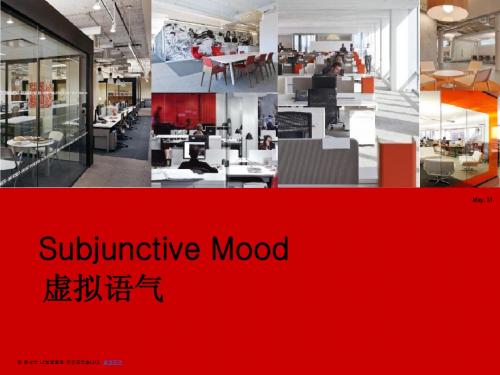
虚拟语气The Subjunctive Mood虚拟语气表示说话人的主观愿望、猜测、建议或与事实不符的假设等,也可以表示可能性较小的情况或不可能发生的情况,而不是客观存在的事实(表示客观事实要用陈述语气)。
虚拟语气是由句中谓语动词的特殊形式表现出来的。
虚拟语气常用于复合句中,也可用于简单句。
一、虚拟语气的用法I. Present Unreal:l If I (you, he / she, we, they) + 动词过去式 (were, did, had, etc.), should / would / could / might + 动词原形e.g. If I had HIV, I would know because I would fell sick.If I were you, I would give an AIDS patient a hug.II. Past Unreal:l If I (you, he / she, we, they) + had + 过去分词, should / would / could / might + have + 过去分词e.g. If she had told him about the danger, he would not have got hurt. If I had known more about giving first aid, I could have helped them. III. Future impossible:1. If I (you, he / she, we, they) + 动词过去式 (were, did, had, etc.), … should / would / could / might + 动词原形e.g. If the teacher asked me to solve the problem next time, I could try my best.2. If I (you, he / she, we, they) should +动词原形, … should / would / could / might + 动词原形e.g. If he should fail in the experiment this time, he would try again.3. If I (you, he / she, we, they) + were to +动词原形, should / would / could / might +动词原形e.g. If we were to panic, we would not be able to help.二、虚拟语气应该注意的问题I. 关于假使条件虚拟语气需注意的几点1. 如果从句所假设的谓语动词发生的时间与主句所假设的谓语动词发生的时间不一致, 这种假设条件句叫错综时间条件虚拟语气. 其主句和从句谓语动词的构成要根据所假设的时间而定.1) If I had taken the medicine, I would be better now. 如果我服用了那种药的话, 现在就会好些了.2) If the weather had been finer, the crops would be growing still better. 如果(前些日子)天气更好些, 庄稼一定会长得更好.2. If it were not for / had not been for…也是一种条件虚拟语气从句, 译为“要不是因为……”.1) If it hadn’t been for the doctor, he wouldn’t have recovered so soon.2) If it were not for the lack of space, we would hold the sports meet today.3. 有些条件是由一些短语引出的 (but for, with, without; otherwise, or, but, etc,)1) We couldn’t have achieved so much without your help (= If we had not had your help).2) Without solar radiation, animals and plants would die.3) With better equipment, we could have done it better.4) But for electricity (= If there were no electricity), there would be no modern industry.5) I should have returned the book last week, but I was so busy thatI forgot to do so.6) He was having a meeting; otherwise he would have come over to help us.7) He felt very tired yesterday, or he would have attended the party.4. 在某些隐含的虚拟条件简单句中, 虚拟语气可通过上下文表现出来. 谓语动词用虚拟形式.1) Any men in his position would have done like that.2) You should (ought to) have come earlier.II. 虚拟语气祈使语气的混合使用在有些情况下, 条件从句中的谓语由”should + 原形动词”构成, 这时主句的谓语动词既可以是虚拟语气或陈述语气, 也可以是祈使语气.1. If it should rain, the plan will / would be called off.2. Should anyone phone, please tell them I’m busy.3. Even if (If) it should get stormy, I will go.III. 表示要求, 建议, 命令的虚拟语气表示要求, 建议, 命令的从句中, 谓语动词要用should + 原形动词, 其中可以should 省略. 下列例句可以表示这种虚拟语气.a. 主宾语从句表示法: suggest, order, request, advise, require,insist, ask, demand, command, propose等动词后面的宾语从句要用原形动词should + 原形动词, 可以省略.1. The doctor advised that I (should) take a rest.2. The London dockers demanded that their wages (should) be raised.3. He insisted that the meeting (should) not be put off.l 当suggest, insist 等动词表示”暗示, 坚持说”时, 其宾语从句中的谓语动词不需要用虚拟语气, 要用陈述语气.1. Are you suggesting that I am not suited for the job?2. He insisted that he was innocent.b. 主语从句表示法: 当以上动词用在下列句型中时, 主语从句也应该用should + 原形动词1. It is suggested that the building (should) be pulled down.2. It is ordered that the work (should) be started at once.l 在It is (was) strange (necessary, wonderful, important, etc.) that…句型中, strange, necessary等后面的主语从句中用should + 原形动词, should可以省略.3. It is strange that he (should) refuse to come to the party.4. It is necessary that a doctor (should) be sent for at once.5. It is important that we should learn from toehrs.e. 表语从句表示法.suggestion, proposal, order, advice, demand 等名词作主语时, 其后面的表语从句中也用虚拟语气, 即should + 原形动词, should 也可以省略.1) My advice is that you (should) give up smoking.c. wish 后面所跟宾语从句要求谓语动词用虚拟语气.e.g. I wish that she were here with me and that we weren’t sick.I wish I had sent the old man to hospital in time.d. 在as if引起的从句中,动词一般用虚拟语气, 通常用weree.g. People treat me as if I were a dangerous person.I remember the whole thing as if it happened yesterday.f. 同位语从句表示法.1. That evening came the order that we (should) cross the river at once.IV. 虚拟语气中常见的句型有1. It is (high / about) time that…这一从句的谓语动词用过去式或should + 原形动词, 其中should不可以省略. 此句型译为”该是……时候了”.2. would rather sb. did sth. / had done sth.此句型表示”宁愿让某人……”, 如果是没有发生的动作, 从句用过去时; 如果是已经发生的事, 从句用过去完成时.1) I’d rather you left tomorrow.2) I’d rather they hadn’t gone to school yesterday.3. if only…此句型表示”要是……就好了”. 其后面句子的时态与wish引导的宾语从句相同, 既:如果虚拟现在, 要用一般过去时; 如果是虚拟过去, 要用过去完成时; 如果是虚拟将来, 则应该用 would或 could加原形动词.1) If only I were a bird!2) If only I had worked hard as a student!3) If only I could land on the moon!4. 连接词in case可用来引起的虚拟语气. 形式通常为: in case + 主语 + should +动词原形. in case句中should 的可以省去, 也可以不用虚拟语气, 而用陈述语气.1) He took his rain coat with him in case it should rain.2) He doesn’t dare to leave the house in case he is (should be) recognized.。
The Subjunctive Mood 虚拟语气虚拟语气的三个基本句型:表示与现在的事实相反:if 从句中: did主句中: would/should/could/might +doe.g. If I had a mobile phone, I would call you every day.If he were here, everything would be all right.----- Were he here, everything would be all right. (倒装语序)If I were a bird, I would fly freely in the sky.--- Were I a bird, I would fly freely in the sky. (倒装语序)(B) 表示与将来的事实相反:if 从句中:(a) did(b) were to do(c) should do主句中:would/should/could/might +do陈述语气: If it rains tomorrow, I will not go to the park.虚拟语气: If it rained tomorrow, I would not go to the park.If it were to rain tomorrow, I wouldn’t go to the park.--- Were it to rain tomorrow, I wouldn’t go to the park. (倒装语序) If it should rain tomorrow, I wouldn’t go to the park.--- Should it rain tomorrow, I wouldn’t go to the park. (倒装语序)(C) 表示与过去的事实相反:if 从句中: had done主句中:would/should/could/might + have donee.g. If he had passed the exam last term, he would have got a present from his father.--- Had he passed the exam last term, he would have got a present from his father. (倒装语序)If it hadn’t been sunny yesterday, they wouldn’t have harvested the rice.--- Had it not been sunny yesterday, they wouldn’t have harvested the rice. (倒装语序)混合形式的虚拟语气: (if 从句与过去的事实相反,主句与现在的事实相反)e.g. If you had spoken to him about it last time you saw him, you would know what to do now.If I had taken my umbrella with me when I came out this morning, I shouldn’t be wet now.He would be studying at university now if he had passed the college entrance examinations.had expected / had hoped that ...would do ... 表示未实现的愿望或出乎意料的事实:I had hoped that I would be a doctor, but I became a teacher at last.He had expected that his daughter would be a soldier, but she was not strong enough.would rather (that) sb. did sth. 表示”倒是希望” (现在或将来......)would rather (that) sb. had done sth. 表示”倒是希望” (过去......)e.g. I would rather (that) he were not so rude to his teachers.I would rather (that) he came here tomorrow than today.I would rather (that) you had not told her the truth last night.(5) wish 后的从句中用虚拟语气: 多么希望......, 但愿......e.g. How I wish I were a girl !How he wishes that he could fly across the Atlantic to meet his girlfriend!How I wish I had not lost my money on the way back home yesterday!注意mind(介意,反对)的用法:e.g. Do you mind sitting here ? = Do you mind if you sit here?(陈述语气)Do you mind my sitting here? =Do you mind if I sit here? (陈述语气)Would you mind sitting here? = Would you mind if you sat here?(虚拟语气) Would you mind my sitting here? = Would you mind if I sat here? (虚拟语气) (7) It is time (that) ... did sth.It is high time (that) ... did sth.It is about time (that) ... did sth.该做某事了;是做某事的时候了;早该做某事了e.g. It is time for lunch.It is time to have lunch.It is time for us to have lunch.It is (high / about) time (that) we had lunch.if only 若是......该多好:e.g. If only I had a sister.If only she were together with me enjoying the happy mornings.If only he could travel in space.If only I had bought that expensive car last spring.what if ...? 若是......会如何? 要是......又怎样?e.g. What if he were not in at this moment?What if he couldn’t afford such a car?What if we had not met at the party last night?在表示”命令,要求,请求,建议”等意义的名词性从句中,使用(should) +do 结构: (A) It is better that...(should) + do It is important that... (should) + doIt is natural that... (should) + do It is necessary that... (should) + doIt is possible that... (should) + do It is strange that... (should) + doIt is vital that …(should) + doIt is desirable that …(should) + doIt is ordered that... (should) + do It is suggested that... (should) + doIt is required that... (should) + do It is demanded that... (should) + doe.g. It is necessary that he (should) be present at the conference.It is strange that she should have failed in the last test. (过去)It is ordered that the classroom (should) not be opened until 7 a.m.It is required that every room (should) be cleaned every day.(B) ask要求advise建议suggest 建议propose建议recommend建议,推荐urge 敦促decide insist坚持要求order命令request请求require要求direct 指示instruct 指示desire 欲求demand要求+ that-从句:e.g. He insisted [(on it) that ] John (should) pay for the broken glass.We strongly suggest that Smith (should) be told about his physical condition as soon as possible.They recommended that a second chance (should) not be given to any of them. advice demand request order decision requirement suggestion proposal (建议)recommendation urge desire direction instruction + that-从句(名词性从句)e.g. Your suggestion that he (should) be invited to the party was rejected by the teacher.His advice is that she (should) wait until next week.注意suggest 和insist 两个不同用法:(A) suggest 建议(虚拟语气):I suggest a party tonight.I suggest having a party tonight.I suggest them having a party tonight.I suggest that they (should) have a party tonight.I suggest that a party (should) be held tonight.suggest 暗示,使人联想到(陈述语气,时态一致):His accent suggests that he is from /comes from Shanghai.His words suggested that he didn’t agree with what you had said.Her red face suggested that she was shy while speaking in public.insist 坚持要求(做某事)(虚拟语气):She insisted on being sent abroad for further education..She insisted [(on it) that] she (should) be sent abroad for further education. insist 坚持说,坚持认为(陈述语气,时态一致):She insisted on being correct.She insisted [(on it) that] she was correct.The man insisted [(on it) that] he had never seen me before.隐含的虚拟语气:(A) or / otherwise 否则,要不然e.g. I don’t know his address. Otherwise I would write to him often.He didn’t come to school yesterday, or he would have handed in his homework. without若不是,要是没有but for若不是,要是没有but that-从句若不是If it were not for...若不是(现在或将来)If it had not been for... 若不是(过去)e.g. Without water / But for water / If it were not for water / Were it not for water, there could be no life.But for your help / Without your help / If it had not been for your help / Had it not been for your help, we wouldn’t have finished the work on time last week.He could have got lost (虚拟语气) in the forest but that the guide helped (陈述语气) him.(13) as if / as though 似乎,好象even if / even though 即使.纵然supposing 假定e.g. Alan talks as if he knew everything.A pencil partly in a glass of water looks as if it were broken.She looked as if she had been weeping.The old man held her as if she would not let her go.She talks a lot about the Great Wall as though she had been there herself. Catherine remembers the whole thing as if it (had) only happened yesterday. Supposing the weather was (were) bad tomorrow, what would your plans be? Nothing could have saved him even if he had been tended without delay.(14) in case 万一,以防for fear that 惟恐e.g. I will take a raincoat with me in case it rains / in case it should rain.I hid myself behind the door for fear that I should be found.(15) so that / in order that以便,为了: (时态一致)e.g. She gets up early every morning so that she can get to school on time.She got up early this morning so that she could get to school on time.She repeated what she had said in order that she might be clearly heard.。